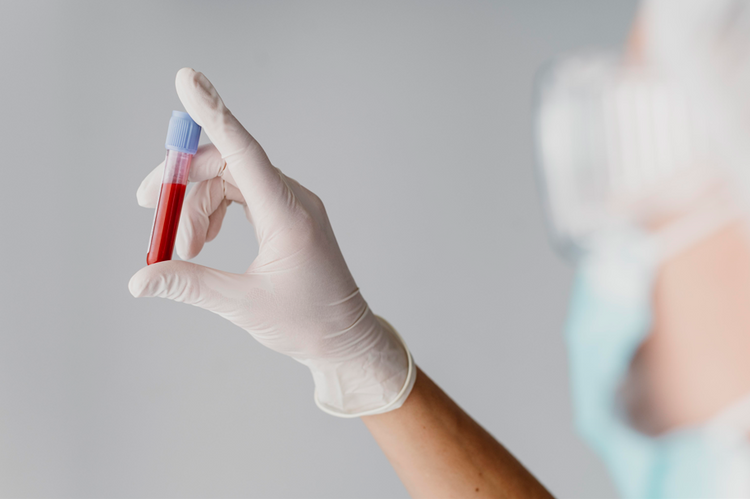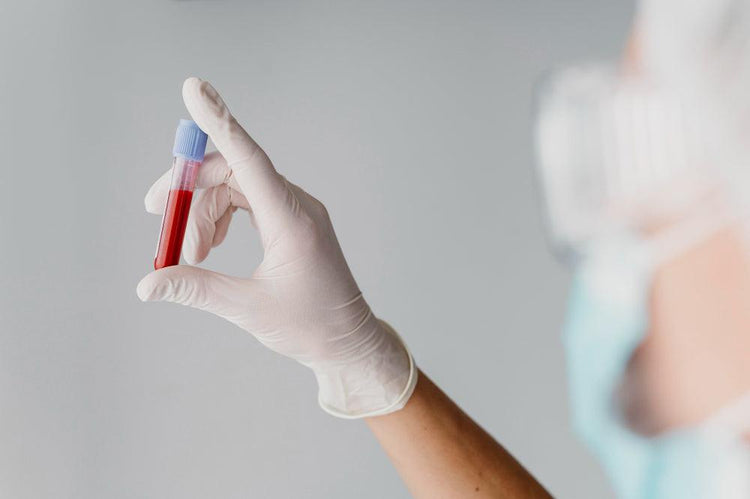How to reduce CRP levels?
.png?v=1675082705608)

Related products
C-reactive protein (CRP) is a critical biomarker in pathology and clinical diagnostics, widely used to detect inflammation in the body. Produced by the liver, CRP levels rise sharply in response to inflammation triggered by infections, autoimmune conditions, tissue damage, or chronic diseases such as cardiovascular disorders and diabetes. Because CRP is part of the acute-phase response, even minor physiological stressors can cause significant spikes in its levels. Elevated CRP can be one of the first signs that something within the body is amiss, even before symptoms fully present.
A high CRP reading, especially when persistent, may indicate chronic inflammation. This is a known precursor to diseases such as atherosclerosis, metabolic syndrome, and certain types of cancer. CRP doesn’t specify the source of inflammation but alerts clinicians to the need for further investigation. As such, it is often paired with other markers or imaging studies to confirm a diagnosis.

If you’re experiencing fatigue, joint pain, recurring infections or suspect inflammation, testing your CRP could be the ideal first step. You can now do this easily from home using the CRP Blood Test from Welzo, which measures inflammation levels quickly and accurately, enabling you to take timely action based on real data.
To explore additional health insights beyond CRP, Welzo’s Home Blood Tests main page offers a comprehensive selection of diagnostic kits, ranging from nutrition and hormone panels to heart health and fertility tracking—all without needing a GP appointment.
What Causes Raised CRP Levels?
CRP elevation is the body’s non-specific response to stress, damage, or foreign invaders. It’s part of a rapid defence system aimed at minimising harm and starting repair processes. However, persistent or chronically high CRP is an indicator that something more serious may be at play.
Health conditions that elevate CRP include:
-
Acute and chronic infections: From seasonal flu to chronic conditions like hepatitis or tuberculosis.
-
Autoimmune diseases: Rheumatoid arthritis, lupus, and psoriasis all drive systemic inflammation.
-
Cardiovascular issues: Inflammation of arterial walls often precedes cardiovascular events such as heart attacks.
-
Cancer and malignancies: CRP is often raised in advanced cancers or those with metastasis.
-
Obesity and poor metabolic health: Excess fat tissue promotes a chronic inflammatory state, even in the absence of disease.
Lifestyle factors such as smoking, chronic stress, poor sleep, and a sedentary lifestyle also contribute significantly to elevated CRP. Identifying the underlying cause with a CRP test is essential before creating an action plan to bring levels back into the healthy range.
Complementing a CRP test with broader panels can provide better insights. For example, if fatigue and hormonal imbalance are suspected, consider combining it with the Free Testosterone Blood Test, especially for men, as low testosterone is often linked to inflammation and fatigue.
Reducing Your CRP Levels Through Lifestyle Adjustments

Adopting the right lifestyle practices is one of the most reliable ways to lower CRP levels and reduce chronic inflammation. These interventions are not only preventative but also therapeutic for those already managing chronic conditions.
Key lifestyle actions that lower CRP include:
-
Engaging in regular aerobic activity: Aim for at least 30 minutes daily. Brisk walking, cycling or swimming helps decrease visceral fat, a major source of inflammation.
-
Prioritising high-quality sleep: Poor sleep contributes to elevated cortisol and systemic inflammation. Stick to a consistent sleep schedule and minimise screen time before bed.
-
Stress management: Long-term stress contributes to elevated CRP via hormonal imbalances. Practising mindfulness, breathing techniques, or yoga can help.
-
Reducing smoking and alcohol intake: Both are pro-inflammatory agents. Quitting smoking and moderating alcohol are crucial steps to protect cardiovascular and immune health.
To better understand how your hormones may be influencing inflammation or fatigue, the Cortisol Blood Test is a valuable companion. Elevated cortisol levels are often associated with stress-driven inflammation, which in turn affects CRP levels.
Dietary Strategies to Lower CRP

Your food choices can either feed inflammation or fight it. An anti-inflammatory diet doesn’t just benefit CRP—it also supports cardiovascular, digestive, hormonal and brain health. The goal is to favour foods that contain antioxidants, fibre, omega-3 fatty acids, and polyphenols while avoiding processed and refined options.
Key foods to include:
-
Berries and citrus fruits: Rich in vitamin C and anthocyanins, these help neutralise oxidative stress.
-
Leafy greens and cruciferous vegetables: Spinach, kale, and broccoli support liver detoxification and immune modulation.
-
Healthy fats: Extra virgin olive oil, avocado, and fatty fish like salmon provide anti-inflammatory omega-3s.
-
Nuts, legumes, and whole grains: Help regulate insulin and cholesterol—two major contributors to chronic inflammation.
Supplements and nutrients:
-
Omega-3 fatty acids
-
Vitamin E and B-complex (especially niacin)
-
Curcumin (from turmeric) and ginger extracts
For individuals wanting to assess their diet’s impact on inflammation, consider checking your essential fat balance with the Omega 3 and 6 Essential Fatty Acids Blood Test, which is particularly useful in tailoring dietary strategies based on actual deficiencies or imbalances.
If your symptoms suggest a broader nutritional issue, Welzo’s All Nutrition and Intolerance Tests Collection can offer deeper insights into how food sensitivities may be contributing to inflammation and elevated CRP.
Medical Treatment for Elevated CRP
Lifestyle interventions should ideally be the foundation of any inflammation-lowering plan. However, in cases where CRP levels remain high despite improvements in diet and activity, medications may be necessary—especially when linked to diagnosed medical conditions.
Commonly prescribed medications include:
-
Statins: These cholesterol-lowering drugs also have significant anti-inflammatory effects, useful in preventing cardiovascular events.
-
ACE inhibitors and beta blockers: Besides managing blood pressure, these drugs also reduce vascular inflammation.
-
Diabetic medications: Some drugs, like metformin or thiazolidinediones (e.g. rosiglitazone), lower CRP by reducing insulin resistance.
-
Immunosuppressants and corticosteroids: Used for autoimmune conditions, these suppress inflammatory pathways.
Pairing your treatment with diagnostic testing can help track your progress. The Advanced Thyroid Function Blood Test is particularly helpful if your CRP elevation is suspected to be linked to metabolic or autoimmune thyroid disorders, which often manifest with vague symptoms like fatigue, weight changes, and mood fluctuations.
The Link Between Hormones, CRP and Chronic Disease
Inflammation and hormones are deeply interconnected. Hormonal imbalances often precede metabolic disorders and may be responsible for raised CRP levels—especially in men and women experiencing fatigue, weight gain, or fertility concerns.
Conditions where CRP and hormones are linked:
-
Low testosterone levels: May contribute to increased fat accumulation and inflammation in men.
-
Elevated cortisol: Chronic stress leads to persistently high cortisol, which increases CRP.
-
Estrogen fluctuations: Women with PCOS or during menopause often report raised inflammatory markers.
-
Thyroid dysfunction: Hypothyroidism can promote inflammation and weight gain, raising CRP over time.
The AMH Blood Test and Female Hormone Blood Test from Welzo provide insights into reproductive hormone levels, which can help identify hormone-driven inflammation, particularly in younger women or those trying to conceive.
For men seeking to understand their broader health, the Men’s Health Tests Collection is ideal—it includes testosterone, prostate, and metabolic panels that intersect directly with inflammation and chronic disease risk.
Conclusion: Taking Proactive Steps to Control Inflammation
CRP is more than a lab number—it's a window into your body’s internal state. A raised CRP may be the first sign of trouble, but it also gives you the chance to take corrective action before problems become irreversible. Whether it's cardiovascular risk, hidden infection, or a hormonal imbalance, CRP points you toward the need for further investigation.
Taking control of your inflammation begins with knowing your numbers. Welzo’s Home Blood Test hub offers a wide range of affordable, accessible kits to help you get started. From inflammation to nutrition and hormonal balance, their platform supports a full-spectrum view of health—all without leaving home.
Incorporating evidence-based dietary habits, consistent movement, stress reduction, and sleep hygiene is not just good for CRP—it’s good for your heart, brain, joints, and long-term resilience. Should your doctor recommend medication, follow through with monitoring and adjustments as necessary.
Ready to take your health seriously? Welzo’s All Health Tests Collection can help you tailor a strategy that reflects your goals, history, and unique biology. It’s time to stop guessing and start measuring—your health is worth it.






























 Rated Excellent by 26,523+ Reviews
Rated Excellent by 26,523+ Reviews